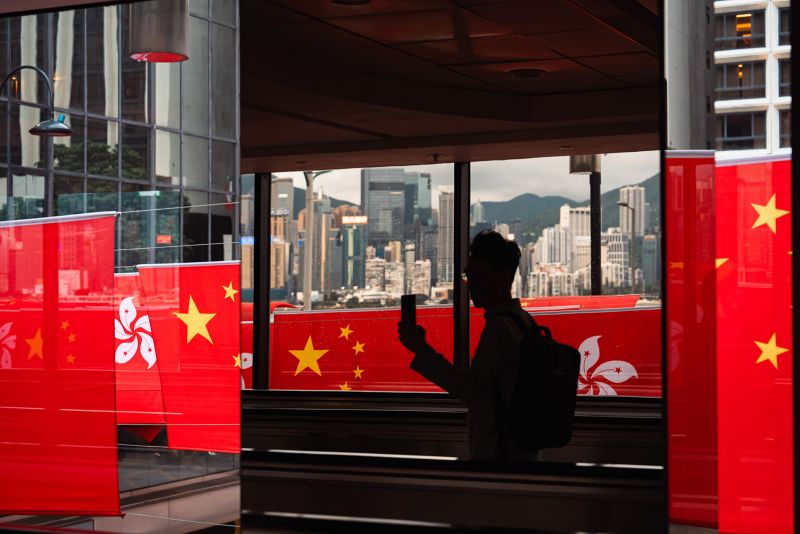Hong Kong’s legislature unanimously passed sweeping new powers on Tuesday that critics and analysts warned would align the financial hub’s national security laws more closely with those used on the Chinese mainland and deepen an ongoing crackdown on dissent.
The lengthy national security bill – the first draft ran to 212 pages – was rushed through the city’s opposition-less Legislative Council with unusual haste at the request of city leader John Lee and debated over just 11 days.
Coming into effect on Saturday, the law introduces 39 new national security crimes, adding to an already powerful national security law that was directly imposed by Beijing on Hong Kong in 2020 after huge and sometimes violent democracy protests the year before.
That law has already transformed Hong Kong with authorities jailing dozens of political opponents, forcing civil society groups and outspoken media outlets to disband and transforming the once freewheeling city into one that prioritizes patriotism.
Known locally as Article 23, the new national security legislation covers a raft of new crimes including treason, espionage, external interference and unlawful handling of state secrets, with the most serious offenses punishable by up to life imprisonment.
Hong Kong’s Chief Executive Lee described it as a “historical moment for Hong Kong.”
“We … have completed a historical mission, lived up to the trust of the country and did not let the Central government down,” he said, referring to China’s Communist Party leadership in Beijing.
China and Hong Kong’s leaders say the new laws are needed to “plug loopholes” as part of their drive to “restore stability” following the huge 2019 protests. They argue their legislation is similar to other national security laws around the world.
Critics counter that what China’s Communist Party views as national security offences are far broader and more sweeping, often ensnaring political criticism, dissent and even business activity that would not be criminalized elsewhere.
The new legislation also comes as Hong Kong’s government is embarking on a high-profile campaign this year to revive the city’s business credentials after the political crackdown – combined with nearly three years of strict coronavirus controls – sparked an exodus of local and international talent.
‘Chilling effect’
“The Hong Kong authorities are eager to further tighten information control in the city as a corollary of stricter security legislation,” said Eric Lai, research fellow at Georgetown Center for Asian Law, and an expert on Hong Kong’s legal system.
Lai expects a “chilling effect” to deepen across society.
“The business community would be particularly affected by the new ‘theft of state secrets’ and ‘espionage’ offenses,” Lai added.
The new legislation has outlawed “unlawful acquisition,” “possession,” and “disclosure of state secrets,” alongside the crime of “espionage.” Offenders can be jailed for up to 20 years in the most serious circumstance.
Observers say the law’s wording has a broad interpretation for what counts as a state secret.
The definition ranges from a secret “concerning the construction of national defense” and “diplomatic or foreign affair activities” of China to any “major policy decision on affairs” and “the economic or social development” of both Beijing and Hong Kong.
Hung Ho-fung, sociology professor at Johns Hopkins University, said that when social and economic affairs are treated as state secrets, “this is to say it can include anything.”
“With these draconian and not clearly defined clauses, even apolitical business persons can get into trouble and will face the risk of their office being raided and themselves being detained, arrested or placed under exit ban as in many cases in mainland China,” he said.
“This will surely increase the doubt, anxiety, and uncertainty of foreign businesses in Hong Kong.”
In mainland China, national security laws have often ensnared both local and foreign businesses in opaque investigations.
China’s state security authorities raided multiple offices of international advisory firm Capvision last year, part of a broader crackdown on the consulting industry as Beijing tightens control over what it considers sensitive information related to national security.
The law also labels the involvement of “external forces” – a byword for foreign governments and organizations – as an aggravating factor that warrants tougher sentencing.
Amnesty International China director Sarah Brooks said the legislation “delivered another crushing blow to human rights in the city.”
“The authorities have enacted this law in the blink of an eye, killing off any remaining shred of hope that public outcry could counter its most destructive elements,” Brooks said in a statement. “This is a devastating moment for the people of Hong Kong.”
Johannes Hack, President of German Chamber of Commerce in Hong Kong, said while many German businesses remain committed to Hong Kong, they would like to see Hong Kong maintain its unique position that includes free flow of capital and a common law court system.
“[The law] is making it a bit hard to make the case for our German shareholders that this is Hong Kong and this is different from mainland China,” he said.
That is something Emily Lau, a former pro-democracy lawmaker, also worries about, that what made Hong Kong distinct is fast fading.
“But we are different from the rest of China. But the difference is getting less and less, which is very sad.”

